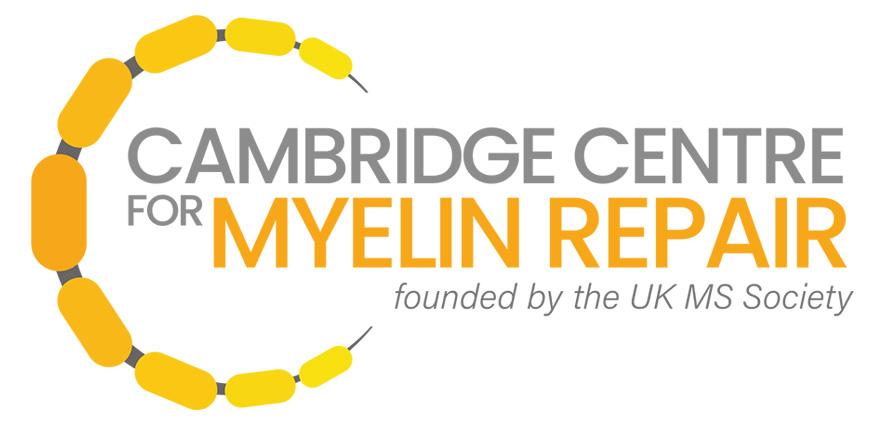
The MS Society Cambridge Centre for Myelin Repair (CCMR) was established in 2005 with the aim of developing treatments that promote myelin repair for people with multiple sclerosis (MS).
Cambridge has for a half a century been leading the research relating to MS biology and as such attracted talent from far to work on MS related research.
CCMR is based on a multi-PI coordinated programme that brings together the diverse but complementary expertise available in Cambridge, coordinating focus on MS regenerative medicine field, where each piece of research feeds into the next like a production line. The multi-disciplinary approach is guaranteed by the presence of PIs and researchers with different resources and expertise, coming together from different departments of the University of Cambridge (Clinical Neuroscience, Veterinary, Paediatrics, Neurosurgery and the Cambridge Stem Cell Institute).
They all are bonded by their shared vision of making discoveries that will directly benefit people with MS, preventing the death of nerve fibres in the brains and spinal cords of people with MS and ultimately live in a world where there are no consequences of an MS diagnosis.
In 2020, funding was renewed for five years to continue to deliver ground breaking research in myelin biology and MS and set up for the first time a structured training programme focused exclusively on training the next generation of MS researchers and academic neurologists. CCMR offers fully-funded PhD positions to motivated students to undertake a PhD at the University of Cambridge.
CCMR is accompanied by the MS Society Edinburgh Centre for MS Research in the journey to discover new treatments.
Key research themes
- Age and Remyelination
- Neuronal health and remyelination
- Translational platform for effective remyelination
Strategic Team

Prof Ragnhildur Thóra Káradóttir
Director of CCMR | PI | Strategic Committee Member
Ragnhildur Thóra Káradóttir did her undergraduate degree in Biochemistry at the University of Iceland. For her postgraduate training, she entered the Wellcome Trust 4-year PhD Programme in Neuroscience, at UCL, where she did her PhD with Prof. David Attwell. Immediately after her PhD she was awarded a Dorothy Hodgkin Fellowship of the Royal Society, and in 2011 she was awarded a Wellcome Trust Career Development Research Fellowship.
Since establishing her lab, she has been awarded a number of awards, most recently the Lister Institute Research Prize (one of 5 in the UK), the Allen Distinguished Investigator Award (one of 5 worldwide, first time given outside of USA) and an ERC consolidator award. In 2015 she was elected to the FENS-Kavli Network of Excellence (one of 20 in Europe) and in 2017 awarded the Fabiane Carvalho Miranda International Prize for the best paper published in the years 2015-2017 in myelin biology and MS related research.
Her main research interest is to understand how neuronal activity can regulate oligodendrocyte precursor cells (OPCs) differentiation and myelin plasticity in health and disease. Her new line of research interest is to determine the changes in myelin and myelin repair throughout the lifespan.
Affiliation: Wellcome - MRC Cambridge Stem Cell Institute, Department of Veterinary Medicine
Prof Alasdair Coles
Co-Director | PI | Strategic Committee Member
Alasdair Coles is Professor of Clinical Neuroimmunology in Cambridge. He was closely involved in the development of alemtuzumab (“Lemtrada”) as a treatment of multiple sclerosis. Since then, he has set up trials of remyelinating drugs in multiple sclerosis, first bexarotene [which has now completed] and more recently metformin and clemastine. He is also doing a trial of immunotherapy in autoimmune psychosis. He chaired the MS Society group that identified drugs to repurpose to treat progressive MS and chairs the Scientific Committee of the UK’s MS Register.
Affiliation: Department of Clinical Neurosciences
Prof Stefano Pluchino
PI | Strategic Committee Member
Stefano Pluchino is Professor of Regenerative Neuroimmunology and Honorary Consultant at the University of Cambridge since 2010. He obtained his MD and PhD at the University of Siena (Italy), and progressed to two consecutive post doctorate appointments at the San Raffaele Scientific Institute in Milan, Italy.
His research over the last 20 years has recalibrated the classical view that cellular grafts only function through structural cell replacement and opened up a new therapeutic avenue by which to use exogenously delivered stem cells, or even stem cell-derived acellular therapies that include extracellular vesicles and exosomes.
His main goal is to develop experimental molecular medicines, including those with stem cells and gene therapy vectors, to slow down the accumulation of irreversible disabilities and improve functional recovery after progressive multiple sclerosis.
He has published over 250 papers - including some breakthrough articles in Nature, Cell Stem Cell and Molecular Cell - and is internationally recognised as a leader and pioneer in the field of Regenerative Neuroimmunology. He is the recipient of several international awards, such as the 2003 European Charcot Foundation (ECF) Award, the 2006 Serono Foundation Multiple Sclerosis Award, the 2007 Rita Levi-Montalcini Award, and the 2010 European Research Council (ERC) Consolidator Award.
He was the recipient of the 2007 Rita Levi-Montalcini award (FISM), the 2009 Italian Ministry of Health Young Investigator Award and the 2010 International Royan Award for outstanding research in Stem Cell Biology and Technology.
Affiliaton: Department of Clinical Neurosciences






